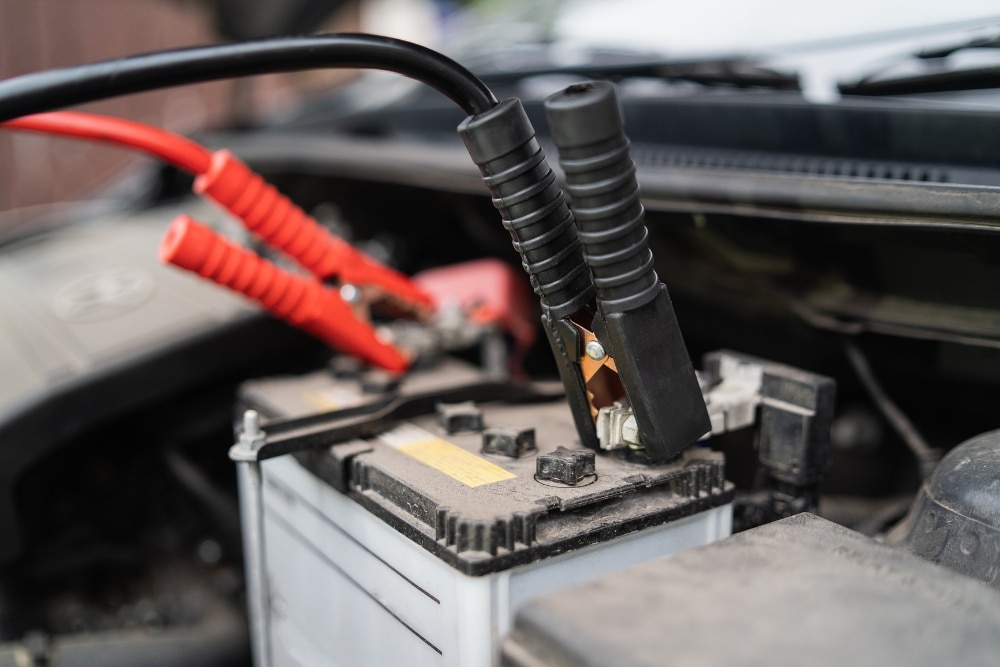Your car battery is crucial to your vehicle’s operation, yet it’s often overlooked—until it fails. If you’ve ever dealt with a dead battery, you know how frustrating it can be.
A common question we hear at E&G Automotive in Chicopee, MA, is: “How long do car batteries last?” On average, car batteries last three to five years, but factors like climate, driving habits, and maintenance can affect longevity.
Regular battery testing and inspections can prevent unexpected breakdowns. Let’s explore what impacts car battery lifespan, how to extend it, and when to replace your battery.
Why Do Cars Need Different Battery Types?
Not all car batteries are the same. Your vehicle’s power needs determine which type of battery it requires. Here are the most common types:
AGM (Absorbent Glass Mat) Batteries
- Designed for modern vehicles with high electrical demand.
- Spill-proof, vibration-resistant, and longer-lasting.
- Performs well in extreme weather conditions.
SLA (Sealed Lead Acid) Batteries
- Common in standard vehicles.
- Maintenance-free but still requires periodic testing.
- More affordable but less durable than AGM batteries.
EFB (Enhanced Flooded Batteries)
- Built for vehicles with stop-start engine technology.
- More durable than traditional lead-acid batteries.
- Can handle frequent stops and starts.
Lithium-Ion Batteries
- Found in hybrid and electric vehicles (EVs).
- Longer lifespan but higher cost.
- Charges quickly and retains energy well.
Knowing your car battery type can help you make better decisions about maintenance and battery replacement.
The Truth About Car Battery Lifespan – It’s Not Just About Age
Most people assume that if their car starts without issue, their battery must be in good shape. But that’s not always the case. Batteries degrade over time, even if they seem to be working fine.
Several key factors influence how long your battery will last:
1. Short Trips Drain Your Battery
Frequent short trips prevent the alternator from fully charging the battery, causing it to weaken over time.
2. Temperature Extremes Matter
Heat causes battery fluid to evaporate, leading to internal damage. Cold weather reduces a battery’s ability to generate power, making it harder to start your car.
3. High Electrical Demand Can Shorten Lifespan
Heated seats, infotainment systems, and other electronics put strain on your battery. Running these accessories while idling drains power.
4. Corrosion & Poor Maintenance Can Cause Failure
Battery terminals corrode over time, weakening the connection and reducing performance. A battery inspection can help detect early signs of failure.
The “Forgotten Battery” – Are You Overlooking This Essential Component?
For many drivers, the car battery is out of sight, out of mind—until it dies. But a weakening battery can cause problems long before your car refuses to start, leading to:
- Dim or flickering headlights and dashboard lights
- Slower power windows and reduced climate control performance
- More frequent jump-starts, even in mild weather
One overlooked factor? Batteries lose capacity even when not in use. If you have a second car, weekend vehicle, or seasonal ride, its battery may degrade faster than a daily driver’s.
Signs It’s Time for a Battery Replacement
Watch for these warning signs that your car battery may be failing:
- Slow Engine Crank: If your car struggles to start, your battery may not be holding a full charge.
- Dimming Headlights or Electrical Issues: Weak headlights or sluggish power windows can signal battery trouble.
- Frequent Jump-Starts Needed: If you’ve had to jump-start your car more than once recently, it’s a red flag.
- Dashboard Battery Light Is On: A direct warning from your car’s charging system.
- Swollen Battery Case or Corrosion: Visible damage means it’s time for a battery inspection.
How to Get the Most Life Out of Your Car Battery
While no battery lasts forever, proper care can help maximize its life. Here are some simple but effective tips:
1. Drive Regularly and Avoid Frequent Short Trips
If you don’t drive often, consider taking your car for a longer drive once a week to help recharge the battery.
2. Turn Off Accessories When the Engine Is Off
Leaving the radio, interior lights, or charging ports on while the engine is off drains battery power unnecessarily.
3. Schedule Routine Battery Inspections
A simple battery inspection can catch early signs of trouble. If your battery is more than three years old, it’s wise to have it tested annually.
Battery Testing & Replacement at E&G Automotive
Regular battery testing can help you avoid the frustration of being stranded with a dead battery. Our team at E&G Automotive provides comprehensive battery inspections and replacements tailored to your vehicle’s needs.
What Our Battery Inspection Includes:
- Voltage Testing – Measures battery charge levels.
- Load Testing – Checks if the battery can hold a charge under normal conditions.
- Charging System Inspection – Ensures your alternator and connections are functioning properly.
- Terminal Cleaning & Corrosion Removal – Prevents power loss due to dirty connections.
If your battery needs replacing, we’ll install a high-quality battery designed to match your car’s power requirements.
Is Your Battery Ready for the Road? Let’s Find Out!
Don’t wait for a dead battery to leave you stranded. A professional battery inspection at E&G Automotive ensures your car stays reliable. Whether your engine is slow to start or you just want peace of mind, our expert battery testing and replacements keep you on the road. We treat everyone as we would like to be treated ourselves, making customer service our top priority.
Schedule your battery test today by calling 413-474-6791. Visit us at 159 Granby Rd, Chicopee, MA, and let us take care of your car.

